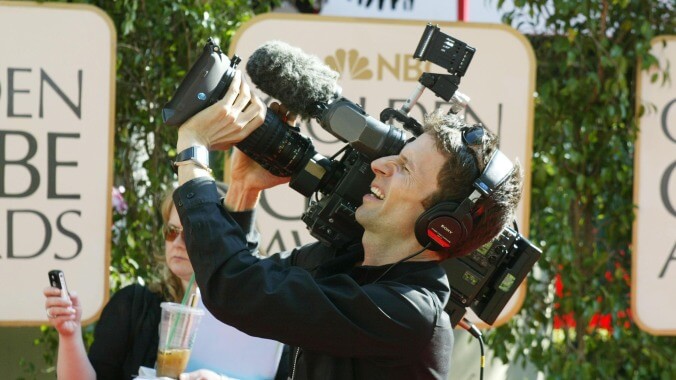A camera operator Photo: Carlo Allegri
The IATSE, the union for production crew members working on movies, TV, and live stage events (you’ve absolutely seen the group’s logo, even if you’ve never considered what its members do), just voted in overwhelming support of a strike authorization today after ongoing talks with the AMPTP (an association that represents the TV networks, movie studios, and production companies when they deal with unions like the IATSE or SAG-AFTRA or the WGA).
The IATSE has been fighting with the AMPTP on a number of issues, with Deadline listing them as unsafe working hours, “unlivable wages,” a “consistent failure” to provide rest periods for meals or sleep, and unfairly low wages specifically for workers on high-budget streaming projects.
The IATSE covers a huge swath of the people who help make movies and TV shows happen, including camera operators, editors, costume designers, and set designers, so there are very few kinds of productions that can happen at all without them, and that means an IATSE strike could have an enormous impact on the whole entertainment industry.
That being said, a strike authorization doesn’t mean a strike is guaranteed to happen—it just means that the IATSE’s president can now call a strike if he thinks he needs to—and even if it does, the fallout could be weird and confusing.
Without getting too deep into Hollywood union rules, Indie Wire explains that a potential IATSE strike would impact something like 60,000 workers across the country, including those working in L.A., Georgia, New Mexico, and Louisiana on movies, scripted TV shows, and unscripted TV shows like talk shows, game shows, and reality shows.
However, the strike would not necessarily apply to productions happening out of New York or for premium cable networks like HBO, Showtime, and Starz, because those are all part of separate union agreements.
So if a strike gets called and you’re a camera operator for a CBS or Netflix show, you would stop working. But if you’re a camera operator on an HBO show, you would not.
Indie Wire’s sources say that it might not be that clean-cut, though, since IATSE members might end up viewing a potential strike as an across-the-board thing that applies to everyone and not just the aforementioned groups. That would mean that all movie and TV production would stop, unlike with the WGA strike in 2007, where someone like Conan O’Brien could still go on TV every night and just aimlessly riff. Making TV without writers is at least theoretically possible, making TV without camera operators and editors is much more difficult.
Business Insider says a major strike like this could drive more productions out of the United States, where different rules apply, but productions that can’t would have to shut down or start instituting delays.
The story also mentions that major networks could just re-air syndicated content, and the streaming services already have their libraries to depend on, but those are temporary solutions—not to mention the fact that these companies pushing content that they already own while trying to avoid having to pay a living wage to the people who were instrumental in making it is… kind of the whole thing.
For now we just wait and see what happens. The IATSE members have authorized a strike, so it’s just a matter of seeing if that will convince the AMPTP to give in to some of their demands or if they’ll dig in and risk getting the entire entertainment industry shut down.

